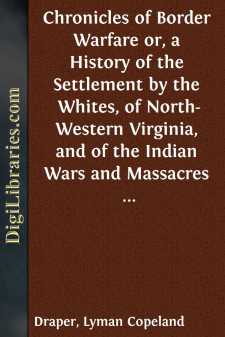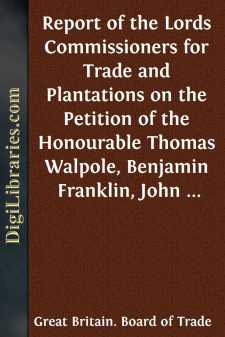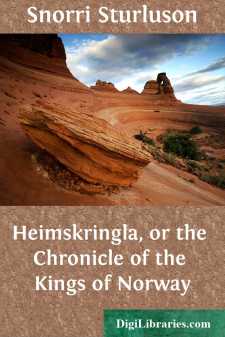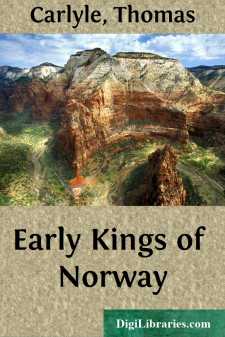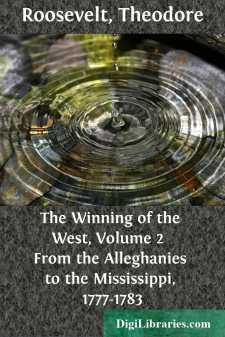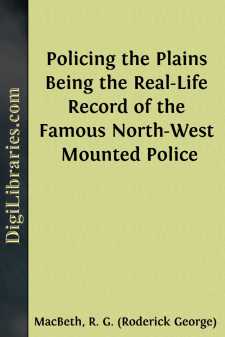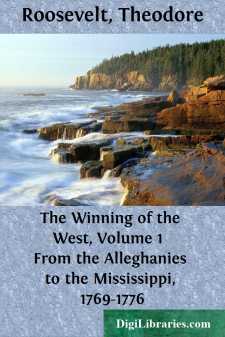History
- Africa 30
- Americas (North Central South West Indies) 50
- Ancient 68
- Asia 58
- Australia & New Zealand 8
- Canada 41
- Caribbean & West Indies 1
- Civilization 20
- Eastern Europe 12
- Europe 310
- Expeditions & Discoveries 60
- General 77
- Historical Geography 1
- Jewish 9
- Latin America 3
- Medieval 8
- Middle East 13
- Military 248
- Revolutionary 8
- Study & Teaching 5
- United States 353
- Western Europe 56
- World 13
History Books
Sort by:
It is sixty-four years since the original edition of Withers’s Chronicles of Border Warfare was given to the public. The author was a faithful recorder of local tradition. Among his neighbors were sons and grandsons of the earlier border heroes, and not a few actual participants in the later wars. He had access, however, to few contemporary documents. He does not appear to have searched for them, for...
more...
My Lords, Pursuant to your lordships order of the 25th May 1770, we have taken into our consideration the humble memorial of the honourable Thomas Walpole, Benjamin Franklin, John Sargent, and Samuel Wharton, Esquires, in behalf of themselves and their associates, setting forth (among other things) "That they presented a petition to his Majesty, in council, for a grant of lands in America (parcel...
more...
I. THE ICE FOLK AND THE EARTH FOLK. The first Ohio stories are part of the common story of the wonderful Ice Age, when a frozen deluge pushed down from the north, and covered a vast part of the earth's surface with slowly moving glaciers. The traces that this age left in Ohio are much the same as it left elsewhere, and the signs that there were people here ten thousand years ago, when the glaciers...
more...
CHAPTER I THE FOUNDERS OF ACADIA The name Acadia, [Footnote: The origin of the name is uncertain. By some authorities it is supposed to be derived from the Micmac algaty, signifying a camp or settlement. Others have traced it to the Micmac akade, meaning a place where something abounds. Thus, Sunakade (Shunacadie, C. B.), the cranberry place; Seguboon-akade (Shubenacadie), the place of the potato, etc....
more...
by:
Snorri Sturluson
In this book I have had old stories written down, as I have heard them told by intelligent people, concerning chiefs who have have held dominion in the northern countries, and who spoke the Danish tongue; and also concerning some of their family branches, according to what has been told me. Some of this is found in ancient family registers, in which the pedigrees of kings and other personages of high...
more...
by:
Thomas Carlyle
CHAPTER I. HARALD HAARFAGR. Till about the Year of Grace 860 there were no kings in Norway, nothing but numerous jarls,—essentially kinglets, each presiding over a kind of republican or parliamentary little territory; generally striving each to be on some terms of human neighborhood with those about him, but,—in spite of "Fylke Things" (Folk Things, little parish parliaments), and small...
more...
CHAPTER I. THE WAR IN THE NORTHWEST, 1777-1778. The Tribes Hold Councils at Detroit. In the fall of 1776 it became evident that a formidable Indian war was impending. At Detroit great councils were held by all the northwestern tribes, to whom the Six Nations sent the white belt of peace, that they might cease their feuds and join against the Americans. The later councils were summoned by Henry...
more...
by:
Elmore Barce
PREFACE In presenting this book to the general public, it is the intention of the author to present a connected story of the winning of the Northwest, including the Indian wars during the presidency of General Washington, following this with an account of the Harrison-Tecumseh conflict in the early part of the nineteenth century, ending with the Battle of Tippecanoe. The story embraces all of the early...
more...
A GREAT TRADITION A few years ago I was away north of Edmonton on the trail of Alexander Mackenzie, fur trader and explorer, who a century and a quarter before had made the amazing journey from the prairies over the mountains to the Pacific Coast. We looked with something like awe and wonder at the site of the old fort near the famous Peace River Crossing, from which, after wintering there in 1792, he...
more...
CHAPTER I. THE SPREAD OF THE ENGLISH-SPEAKING PEOPLES. During the past three centuries the spread of the English-speaking peoples over the world's waste spaces has been not only the most striking feature in the world's history, but also the event of all others most far-reaching in its effects and its importance. The tongue which Bacon feared to use in his writings, lest they should remain...
more...


